Jun
7
2010
or The Real Hebel
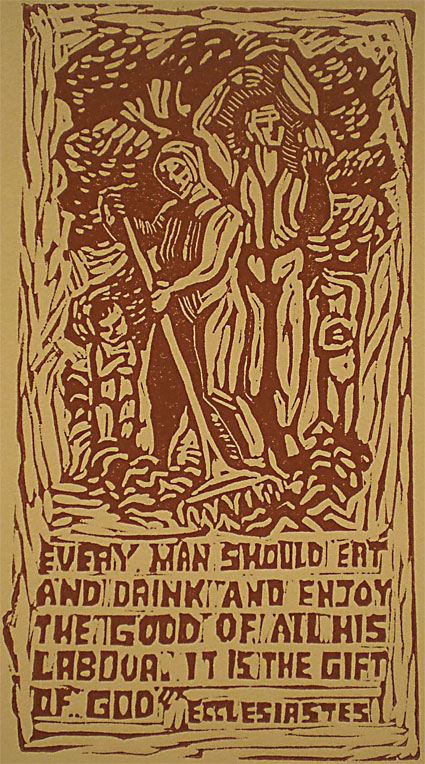
James Jordan was asked whereabouts in the Bible is the best place to start reading it:
We should start in Genesis. What we should really do is pass a law that for five years you may only read Genesis through Joshua over and over again. So you get the foundation… When the Psalms and Ecclesiastes were written, they were written for people who were steeped in the earlier Scriptures. Ecclesiastes is not some mysterious book of philosophy. Ecclesiastes is all about the Feast of Tabernacles. The Feast of Tabernacles is literally the Feast of “Clouds.” That’s what sukkoth means. You get branches down out of a tree to make a little lean-to. Those branches up on that tree are a cloud. When you make a tree-house down here out of those branches, you’ve got your own little cloud. After a week it disintegrates. But God in His cloud, in His Tabernacle, goes on and on.
Continue reading
5 comments | tags: Ecclesiastes, Feasts, Hermeneutics, James Jordan, Solomon, Tabernacles | posted in Biblical Theology, Christian Life, Quotes
Jun
4
2010

Reformation: Redefinition or Glorification?
Pastor David P. Cassidy discussed the redefinition of the “unchangeable Roman church” by Cardinal Newman, a component integral to the possibility of the revolutionary Vatican II, before taking listeners on a tour of the changes that swept through the institution in the twentieth century. Here is the conclusion of the lecture:
…Vatican II represents the most significant shift, not simply within the Roman Catholic Church and in our relationship with it, but in the whole history of church councils. Words such as charism, conscience, the priesthood of all believers, brothers and sisters, collegiality, and so on, dominate the discussions in the documents of the councils. Scholastic theological terminology is eschewed largely in favour of biblical vocabulary. Absent, gone, are words of intimidation and threat, and alienation and exclusion. Vatican II issued not a single doctrinal definition, though that is what councils had always done. Not a single anathema, not a single canon. Power words are gone, replaced by persuasion. Style, of course, has a lot to do with the difference in meaning, as the difference between prose and poetry makes clear. By its choice of language, Vatican II sought to present the Roman Catholic Church as one which retained an interior hierarchical reality, but with a new exterior, serving, personality.
So, what do we learn at the end of this tour?
Continue reading
Comments Off | tags: Church Fathers, Church History, David Cassidy, Liberal theology, Postmillennialism, Roman Catholicism | posted in Quotes
Jun
1
2010

I said, “You are gods, and all of you are children of the Most High. But you shall die like men, and fall like one of the princes.” Psalm 82:6
As discussed elsewhere here, the five-point Covenant model as it gets played out in history becomes seven-point. The central “Ethics” gets split into three: Law-Testing-Law.
Moses, the Covenant head, ascends and receives the Law. He opens it for Israel as Mediator. Israel, as body, is tested under the Law. The Law is given again to a “resurrected” Israel, the next generation.
In microcosm, we see this in the incident with the golden calf. Moses is given the Tablets, Israel is tested, and the Tablets are broken. Moses brings the Law a second time.
In macrocosm, the Law is given from Sinai, Israel is tested for forty years, and Moses brings the Law again in Deuteronomy to a “resurrected” Israel, the next generation.
Continue reading
Comments Off | tags: Exodus, John, Moses, Pentecost, Peter Leithart, Vindication, Zechariah | posted in Against Hyperpreterism, Biblical Theology, Quotes, The Last Days
May
31
2010
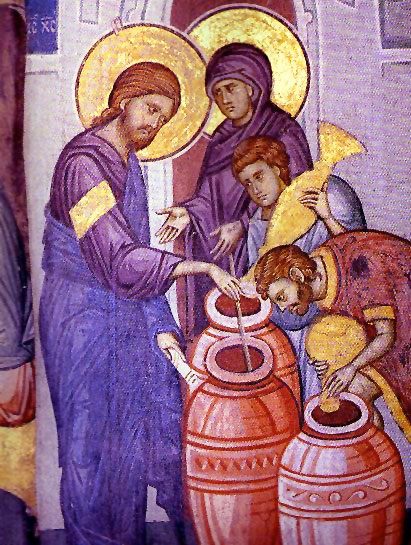
“The Son of Man has come eating and drinking, and you say, ‘Look, a glutton and a winebibber, a friend of tax collectors and sinners!’” (NKJV) Luke 7:34
Some good logical thoughts concerning alcohol from Andre Rook’s blog, and comments from me at the end:
Alcohol is synonymous with sin for many. Still for others it is considered an act of Christian love to perpetually abstain from alcohol, to provide a good Christian witness to others. My beef with the latter view (the former being easily dismissed on account of Scripture, and also condemned in the heresy of Manicheism) is that it creates a counterfeit virtue for the Christian.
Continue reading
Comments Off | tags: Alcohol, Andre Rook, Legalism, Maturity, Pharisees | posted in Biblical Theology, Christian Life, Quotes
May
29
2010
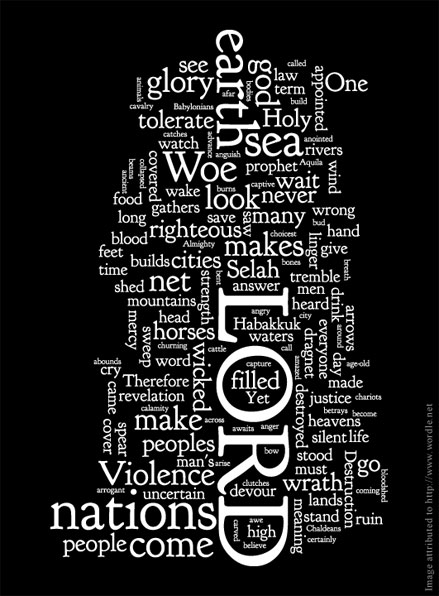
(From The Magnificence of Mercy by Geoffrey Bingham)
‘In wrath remember mercy…’
It would seem that Habakkuk had to remind God that in his wrath He should remember mercy towards errant Israel. The covenant revelation of God in Exodus 34:6 was that He was (is) ‘slow to anger’ (Num. 14:18; Neh. 9:17; Ps. 86:15), especially in regard to Israel. The prophet did not have to remind God, so much as he had to remind himself of the love of God, and to see God’s judgment as the wrath of love. If we ask what causes God’s actions of mercy, grace, slowness to anger (long-suffering), steadfast love, faithfulness, forgiveness and even refusal to clear the (impenitent, obdurate) guilty—as set out in Exodus 34:6-7—then we must answer that it is His love.
Continue reading
2 comments | tags: Ephesians, Exodus | posted in Biblical Theology, Quotes
May
24
2010

“So he drove out the man; and he placed at the east of the garden of Eden Cherubims, and a flaming sword which turned every way, to keep the way of the tree of life.” Genesis 3:24
“And Nadab and Abihu, the sons of Aaron, took either of them his censer, and put fire therein, and put incense thereon, and offered strange fire before the LORD, which he commanded them not. And there went out fire from the LORD, and devoured them, and they died before the LORD.” Leviticus 10:1-2
From Doug Wilson, Cutting Off The Buttons:
The world around us is an unfolding story. The world around us is not a plastic diorama behind the glass in a museum. The kind of objective truth that the faithful Christian insists upon is not to be found in plastic objects that never move, even if their immobility might be a catechetical aid to the bus tours of schoolchildren who come through.
Continue reading
Comments Off | tags: Compromise, Culture, Doug Wilson, Genesis, Leviticus | posted in Biblical Theology, Quotes
May
20
2010
“God is up to something, and He is taking us all the way through.”
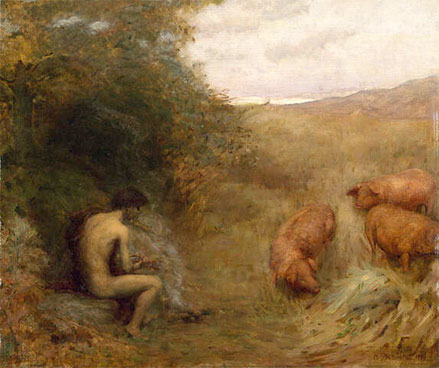
“Now this is the main point of the things we are saying: We have such a High Priest, who is seated at the right hand of the throne of the Majesty in the heavens…” Hebrews 8:1
Conservative Christian people know and understand that we deserve to be brought low. We know and understand the Law of God. We know our own sinfulness. We are very aware of how we fall short in many ways. We know that the holiness of God casts us down. This is all good, as far as it goes. This is healthy, as far as it goes. This is much needed in our day, as far as it goes. But we need to follow God’s purposes all the way out.
Continue reading
Comments Off | tags: Ascension, Crucifixion, Doug Wilson, Faith, Paul, Power of the Gospel, Resurrection | posted in Biblical Theology, Quotes
May
19
2010
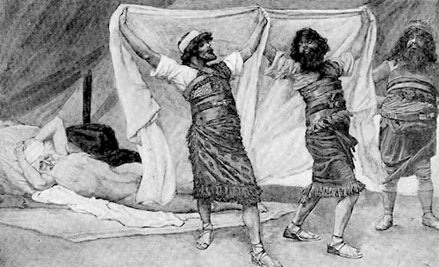
“and their faces were backwards so that they did not see their father’s nakedness” (Gen. 9:23)
James Jordan has some fascinating comments on Ham’s sin in Genesis 19:
Continue reading
Comments Off | tags: Aaron, Atonement, Genesis, Ham, James Jordan, Noah, Priesthood, Tabernacle | posted in Biblical Theology, Quotes
May
15
2010
“Behold, I make all things new” is not something that
we are allowed to say—and it doesn’t work anyhow.
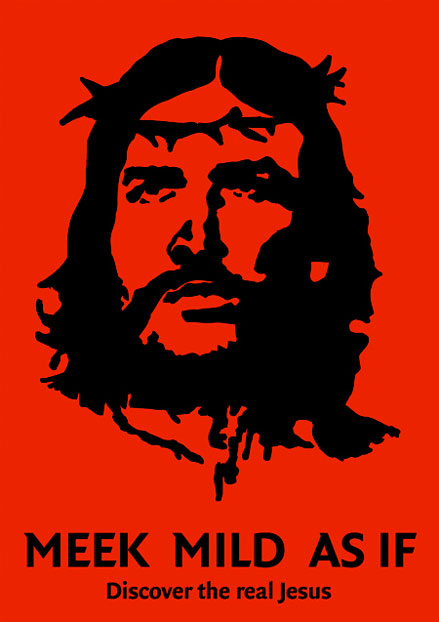
The Sin of the Revolutionary Mind
by Tim Nichols
We worship in heaven, and we are unified with those who join us there in worship—including those believers in other nations, and those who died long before us. This unity surpasses any earthly tie, including ties of where you were born—or when.
The saints of every age and place are Our People, and we should hear the voices of those who have gone before us. They are sinners, and they can be wrong. But so can we, and so we listen to their wise counsel, and—as always—measure everything by Scripture. We cannot be revolutionaries, because we belong to a long line of people from whom we cannot separate, even though we may want to.
Continue reading
3 comments | tags: Communism, Culture, Ecclesiology, Reformation, Revolution, Tim Nichols, Worship | posted in Biblical Theology, Quotes
May
15
2010

.
More on a “temporary” New Jerusalem…
We are establishing the colonies of heaven here, now. When we die, we get the privilege of visiting the heavenly motherland, which is quite different from moving there permanently. After this brief visit, the Lord will bring us back here for the final and great transformation of the colonists (and the colonies). In short, our time in heaven is the intermediate state. It is not the case that our time here is the intermediate state. There is an old folk song that says, “This world is not my home, I’m just passing through.” This captures the mistake almost perfectly. But as the saints gather in heaven—which is the real intermediate state—the growing question is, “When do we get to go back home?” And so this means that heaven is the place that we are just passing through.
— Doug Wilson, Heaven Misplaced, p. 24.
2 comments | tags: Doug Wilson, Postmillennialism | posted in Against Hyperpreterism, Apologetics, Biblical Theology, Quotes, The Restoration Era, Totus Christus



































